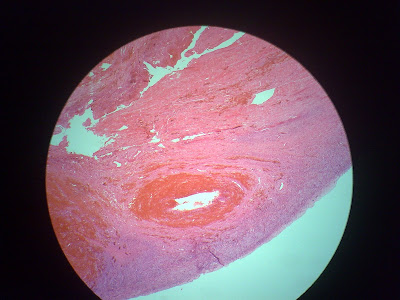With all humility let me introduce myself. I am a doctor who started his career as a houseman in 1983 at the Taiping Hospital. True to the nobleness of my late father and my profession, this is written in full honesty, level-headedness and rationality.
My father, of 94 years of age, passed away on Aug 5 at the Taiping Hospital in Ward D4. Life has to end at one point of our life and there are no misgivings in that. My father was no exception and while I take heed of that, I cannot contain or refrain myself from bringing out the following with all sincerity and truthfulness.
My father was taken to the hospital on Aug 8 with complaints of weakness and walking not as usual and was examined by a doctor at the Accident & Emergency Bay followed by an ECG and chest X-Ray. Blood samples were also drawn for further tests.
Subsequent to this, the doctor had told my uncle that my father's 'heart was weak' and he had to be admitted. Blood investigations revealed elevated cardiac enzymes and a positive Troponin T test was diagnosed as, 'acute coronary syndrome'.
Any doctor worth his salt would have known that a patient of 94 years with evidence of chest infection, elevated cardiac enzymes with a positive Troponin T needs to be in the CCU (Coronary Care Unit) or ICU and it's no rocket science to deduce that. If the blood pressure is on the falling trend he needs to be on some kind of ionotrope if necessary.
The questions that need an answer are the following:
Why was he put into a normal ward?
Why was he on normal diet when rightfully he should have been on a soft diet?
What was the treating doctor waiting for?
Where was the aptitude, logical deliberation of the admitting doctor, the treating physician and the medical officers?
It would seem to me that the medical personnel in the hospital would only act if the patient was to throw a massive myocardial infarction (MI or heart attack) and cardiogenic shock before it warrants the patient to be in an ICU or CCU.
It is my personal feeling that perhaps because my father was 94 years he was therefore worthless, inconsequential, forgettable, unimportant, inessential and ephemeral.
I was further shocked when it was told to me by my sister on the day of admission that a junior doctor who was with another doctor had said the following words in Tamil to her which I translate as follows: 'Do you know what is heart attack? He is having a heart attack. We cannot do anything. You better inform your relatives'.
In my mind, if you are going to say that you cannot do anything for a patient who has been diagnosed as having an acute coronary syndrome or heart attack for that matter, then there is something seriously wrong.
At the time my father was admitted at the Taiping Hospital, I was still in KL. I was trying to contact the Taiping Hospital (05-808 3333) from KL on Aug 5 from 2pm onwards and it was virtually impossible to get the operator on the line as after the completion of the ringing tone, the line gets disconnected.
I am disappointed that a very old man with an acute myocardial injury, blood pressure in the descend and with a diagnosis of acute coronary syndrome was sent to a normal ward. Pray please tell me is this some kind of new management which I may not have known about. This is just mind boggling and if this is indeed a breakthrough I am willing to humble myself.
When I arrived from KL and went to my father's bedside at about 6.30pm, I was concerned that he was not even on a drip or a monitor and appeared to be tachypnoeic, with oxygen prongs in his nostrils. I did notice some Venofix in his elbow.
I was looking for the doctor but was told he was not in any of the wards. By then, I realised without any doubt that my father has to be moved out from that ward if he is to survive as he was 'just sitting on a time bomb.'
At about 7.25pm my father became more tachypnoeic and I could hear wheezing. I realised he was in respiratory distress and immediately I was calling for the nurse to get the doctor-in-charge while trying to get things for a CPR. The nurses appeared to be at a loss and didn't even have the foresight to even bring the emergency trolley if ever there was one.
I was asking them for a cardiac-board (CPR board) but probably they never understood what it was. I told them to fix the pulse-oxymeter and the monitor and by then my father was already showing signs and symptoms of a cardiogenic shock.
His limbs and chest were becoming cold and sweaty The Pulse-Oxymeter was not displaying anything and there was not even an Ambu-bag available at that moment of time. Still there was no signs of the doctor. There was not even an airway at that moment and to my utter dismay and shock while trying to open my father's mouth which was closed I saw that his dentures were still there!
I managed to remove the dentures and kept telling the nurses to get the doctor-in-charge, only to be told that he was on the way. Finally, after a lapse of 10-15 minutes the doctor showed up and only then were the electrodes were placed on my father's chest and the monitor showed marked ST elevations. The doctor told me to stay 'outside' and I was informed that the oxygen saturation was 85% which was anything but reliable.
I am thoroughly disappointed that the doctor was complaining about my presence there. I overheard him say that I had no right to be there or do anything since I am not in government service. This attitude was appalling.
The doctor was much more keen to shine a torch into my father's eyes rather than to take any pro-active measure in resuscitation. I could see that the doctor was not going to intubate though it was absolutely essential to do this with such an oxygen-saturation.
I walked up to the doctor and told him, 'Doctor, he needs to be intubated and if you don't mind, can I intubate' and not surprisingly my request was denied.
I sincerely and wholeheartedly pray that no other son should undergo this trauma where you realise your beloved father's life ebbing away and the doctor is really not doing anything about it and neither allowing you to do something which you are competent to do and to what extent 'bagging' will improve oxygen saturation is anybody's guess. What was so wrong to grant me the permission to perform an indispensable procedure? Was it pride or ego, I ask.
By this time, I knew it would take a miracle, short of divine intervention for my father to come back. All the way through, it was only the houseman who was trying to do 'resuscitation' and only after an aeon later were two other senior doctors were present. But by then it was too late.
As I knew that the houseman was not going to do what was necessary, I told the Ward Sister to contact the doctor whom I had spoken to and to tell the housemen that my father needs to be intubated and to do it immediately.
But sadly, the Sister, instead of getting the doctor on the line, was much more interested to find out to what extent I knew the doctor – whether I knew him personally or not and so till I left the ward after my father's life was extinguished the Sister never got the doctor on the line.
At this juncture, I must also note that this Sister - who was at the Nurses Counter - did not show any urgency towards a patient who has collapsed. Only much later was she there for assistance.
The time of death of my father has been stated as 8.17 pm. This is not true. For more than fifteen to twenty minutes, there was only a pretension of resuscitation when in actual fact, nothing was being done. In reality, my father's life was snuffed out much much more earlier than 8.17 pm.
As a doctor who had gone through the mill for the past 30 years, I could only stand by watching helplessly and witnessing everything that took place
In any resuscitative effort, time is of the essence and there should be a sense of urgency, speed and aptitude combined with a whole lot of doctor's competence. Otherwise, what is undertaken is just perfunctory and the result will be surely and definitely be a failure as to what has happened to my father. None of the abovementioned attributes were present when my father's life was ebbing away.
The final blow for the day came when the lady Medical Officer came and asked me whether they can be allowed to perform a post-mortem on my father – reason being to establish the cause of death. I was at a loss for words. As for me, I feel the onus is on me to confirm the cause of death and in this instant they seem to be multi- factorial. Causes of death of my father:
1. Mismanagement
2. Negligence
3. Incompetence
4. Lackadaisical
5. Inaptitude
6. Nursing Apathy
My father is no more. The happiness, strength you draw and the happy moments you share with an aging father more so if he is good-natured and hale and hearty for his age. With a saintly demeanor, this gift is just colossal and inestimable.
My family's dreams for our aging, dignified father, an embodiment of sacrifice, has been doused because of deplorable reasons and nothing will ever be able to fill the void created.
The old adage, 'something is rotten in the state of Denmark' can now be mutated to'something is seriously and really not right in the House of Hippocrates' as far as Malaysia is concerned.

















































